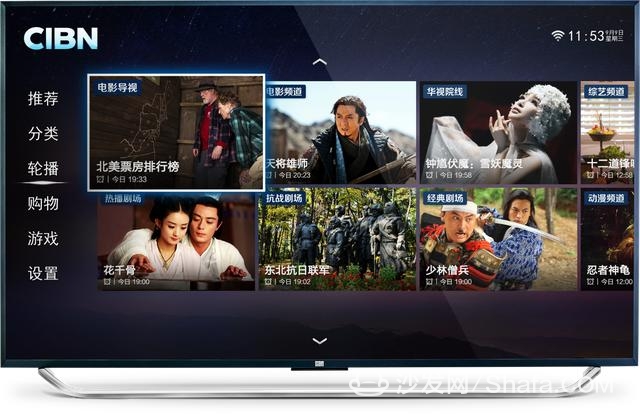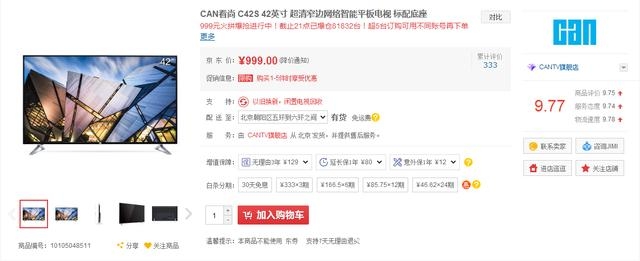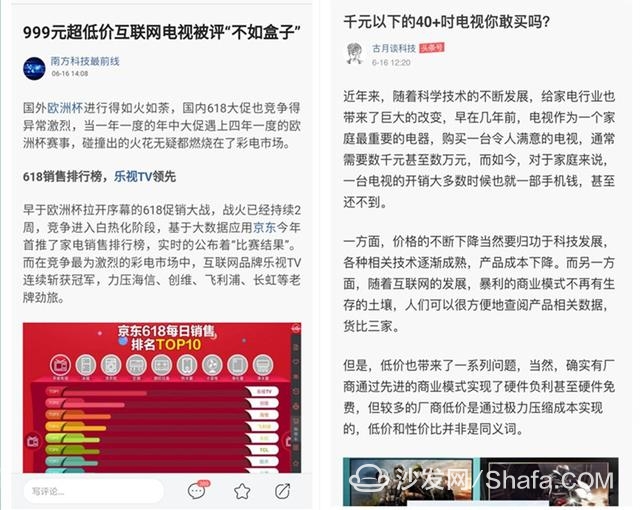When the "Internet +" wave hits with devastation, the Internet and traditional industries are also merging into new opportunities. In recent years, Internet companies such as LeTV and Xiaomi continue to overwhelm the layout of the Internet TV industry, not only forcing the traditional TV manufacturers to actively transform themselves, but also allowing people to see the huge commercial future of smart TVs.

Ovid Cloud Network (AVC) data shows that in 2015, the domestic Internet TV market share reached 11%, and is expected to reach 20% in 2016. It can be seen from this that Internet TV has demonstrated rapid growth, but it will take time to break through the shackles of traditional manufacturers and become the protagonist of the industry. In addition to LeTV and Xiaomi's two "stars," Internet TV urgently needs new force.
Holding an Internet TV license, seeing that the industry still vowed to do "squid"
In fact, one of the key factors restricting the development of Internet TV is "license." According to the existing regulatory policies, terminal manufacturers must cooperate with the broadcasting and TV enterprises that hold Internet TV licenses to produce and sell Internet TV. The seven major Internet TV licensees are: Future TV, BesTV, Huada, South Media, Mango TV, CIBN and Galaxy TV. In other words, LeTV and Xiaomi, which we are familiar with, are still not qualified for the license themselves and can only provide content services to users through cooperation with Internet TV licensees.

In May 2015, the Internet TV market finally ushered in the first "national team" -- the CIB brand under the Internet TV licensee CAN. In April of this year, the CAN brand officially launched the brand's Chinese name as "Looking at Shang". In the following year, CAN has released more than ten brand products such as CANTV Super TV C43/F55 and CANbox Super Cloud Box series, relying on the unique platform advantages and high-quality content resources of CIBN, CANTV “terminal + content + platform + The "service" smart family ecology has taken shape.

Insiders pointed out that Internet TV is actually a complete ecology of “hardware + content + experienceâ€. The advantages of pure Internet manufacturers often lie in the hardware process and performance parameters, but compared with the Internet TV manufacturers of the licensee’s origin, the content is integrated. There will be natural disparities in regulations, and the completeness of service experience. For example, if you look at all the smart TV platform content is an audited compliance application, it will not be like other Internet companies prone to content violations. At the same time, at the system level, it is still based on the deeply customized CANOS system of the Android system, which can also achieve the maximum degree of seamless integration of hardware and content.
In the interview, the chief executive officer Fu Qiang once stated that the increase in the traditional TV market has become saturated. In 2016, if the six major manufacturers such as Hisense, Konka, etc. cannot keep up with the pace of Internet transformation, half of them may be able to The first camp left the team; at the same time, there will be about 4 new brands in the Internet TV brand. The target of watching is to become the top 3 in the new Internet brand.
Since September last year, Smart TV has spent more than nine months selling more than 190,000 smart TVs (online and offline). However, the ambition of seeing is still more than that. Fu Qiang revealed that the overall business goal of CANTV is to develop 10 million Internet users in three years, and this year's target is 1.5 million. "Lokoshi did 1.5 million a year and a half, and we took a lot of detours. In the first year, we have done 1.5 million. Our televisions, boxes, and smart speakers should have no problem."
Break through the industry's price limit, look at still "in the arrow"
In my opinion, the challenges faced by the audience are even more daunting than those of LeTV and Xiaomi several years ago. On the one hand, as the only terminal brand with its own Internet TV license, there is no doubt that it will be smashed and squeezed by the two major camps of traditional manufacturers and Internet TV manufacturers. On the other hand, Internet TV has also changed from the Blue Ocean to the Red Sea. The intensity of competition is rare. As a rising star, it is necessary to find another way to have a chance to overtake.

The upcoming 618 carnival is seen as another positive confrontation between Internet TV and traditional TV manufacturers. It will naturally not let this "upstage" opportunity pass. Look at the recent announcement: its two flagship products, the original price of 1999 yuan C42S, in the Jingdong Mall 618 activities challenge the industry freezing point price, for only 999 yuan; original price 2499 C49S discount 1,000 yuan, for only 1499 yuan. Look at the 618 big promotion strategy is obvious, the price will be challenged to the limit - both products than the mainstream manufacturers the same configuration product offers nearly 1,000 yuan, directly on the price "KO" opponents.


This direct market strategy is undoubtedly in line with the characteristics of "squid" and at the same time it is also a good thing for consumers. But it is worth pondering that, soon after the announcement of the price strategy, the voices of criticism and questioning on the Internet have mushroomed - "Thousands of dollars are hard to buy TV, consumers need to be cautious when buying," and "999 yuan is super. Low-priced Internet TVs are not rated as boxes.... After these seemingly neutral analyses, they all point to a conclusion: 999 ultra-low prices are not reliable, and selling such cheap products should not be a good product.

The author can not help but have two doubts: First, the authors who contributed to these reports did not conduct detailed evaluations and comparisons between the products of Zhishang and mainstream manufacturers, or they were just "neutral" analysis on paper. Secondly, these conclusions may be difficult to defend before the users have voted with their feet. The purpose of guiding public opinion is evident.
All the signs seem to indicate that the price war of the Lord has been “stretched†before the fighting has begun, and the dark arrows from the undisclosed forces. Instead of guessing whether these dark arrows were fired by friendly traders, or to discuss who had cheese in the end, these are less important. In my opinion, it is better to discuss a new issue. Is price war still meaningful to the current Internet TV industry?
Recalling Xiaomi Mobile’s early breakthrough in the shackles of traditional mobile phone manufacturers and winning the support of most young users, its magic weapon lies in the four words “high cost performanceâ€; and LeTV Super TV is the most talked about with traditional manufacturers’ PK. Overly subversive prices, and now Le Leighton to break the traditional hardware manufacturers profit model, and even resorted to the "hardware free" strategy ... Lei Jun's classic interpretation of Internet thinking is "focus, extreme, word of mouth, fast" , but its most important foundation is that the product must have the ultimate pricing.
We also see that Internet TV manufacturers have continued to reduce the price of smart TVs by lowering the price of smart TVs through the ultimate technological innovations and optimization of the supply chain, as well as forcing conventional TV makers to abandon profits. However, 90% of users still do not enjoy the convenience of Internet TV. Most of them are third-, fourth-, and even later-tier urban users. If we want to speed up the overall popularization of Internet TV, creating even more extreme prices is still an unshakable path.
From an outsider's point of view, watching as a new army of Internet TV, there is bound to be a lot of room for improvement in products and services compared to the older players such as LeTV and Xiaomi. However, it is undeniable that they hold license plates and high quality. The advantages of content resources are also very likely to become a magic weapon for achieving “turning overtakingâ€. From its "Armed Arrow" point of view, opponents must have given enough attention to it. Whether the price war can help it to achieve a counter-attack on the 618 Carnival Day, the market will have an autonomy since then.
After all, dreams are still there. Can you become a "carp" that subverts Internet TV? This can be anyone else.
Smart TV/box information can focus on smart TV information network sofa butler (http://), China's influential TV box and smart TV website, providing information, communication, TV boxes, smart TVs, smart TV software, etc. Answering questions.

Holding an Internet TV license, seeing that the industry still vowed to do "squid"
In fact, one of the key factors restricting the development of Internet TV is "license." According to the existing regulatory policies, terminal manufacturers must cooperate with the broadcasting and TV enterprises that hold Internet TV licenses to produce and sell Internet TV. The seven major Internet TV licensees are: Future TV, BesTV, Huada, South Media, Mango TV, CIBN and Galaxy TV. In other words, LeTV and Xiaomi, which we are familiar with, are still not qualified for the license themselves and can only provide content services to users through cooperation with Internet TV licensees.


In the interview, the chief executive officer Fu Qiang once stated that the increase in the traditional TV market has become saturated. In 2016, if the six major manufacturers such as Hisense, Konka, etc. cannot keep up with the pace of Internet transformation, half of them may be able to The first camp left the team; at the same time, there will be about 4 new brands in the Internet TV brand. The target of watching is to become the top 3 in the new Internet brand.
Since September last year, Smart TV has spent more than nine months selling more than 190,000 smart TVs (online and offline). However, the ambition of seeing is still more than that. Fu Qiang revealed that the overall business goal of CANTV is to develop 10 million Internet users in three years, and this year's target is 1.5 million. "Lokoshi did 1.5 million a year and a half, and we took a lot of detours. In the first year, we have done 1.5 million. Our televisions, boxes, and smart speakers should have no problem."
Break through the industry's price limit, look at still "in the arrow"
In my opinion, the challenges faced by the audience are even more daunting than those of LeTV and Xiaomi several years ago. On the one hand, as the only terminal brand with its own Internet TV license, there is no doubt that it will be smashed and squeezed by the two major camps of traditional manufacturers and Internet TV manufacturers. On the other hand, Internet TV has also changed from the Blue Ocean to the Red Sea. The intensity of competition is rare. As a rising star, it is necessary to find another way to have a chance to overtake.




All the signs seem to indicate that the price war of the Lord has been “stretched†before the fighting has begun, and the dark arrows from the undisclosed forces. Instead of guessing whether these dark arrows were fired by friendly traders, or to discuss who had cheese in the end, these are less important. In my opinion, it is better to discuss a new issue. Is price war still meaningful to the current Internet TV industry?
Recalling Xiaomi Mobile’s early breakthrough in the shackles of traditional mobile phone manufacturers and winning the support of most young users, its magic weapon lies in the four words “high cost performanceâ€; and LeTV Super TV is the most talked about with traditional manufacturers’ PK. Overly subversive prices, and now Le Leighton to break the traditional hardware manufacturers profit model, and even resorted to the "hardware free" strategy ... Lei Jun's classic interpretation of Internet thinking is "focus, extreme, word of mouth, fast" , but its most important foundation is that the product must have the ultimate pricing.
We also see that Internet TV manufacturers have continued to reduce the price of smart TVs by lowering the price of smart TVs through the ultimate technological innovations and optimization of the supply chain, as well as forcing conventional TV makers to abandon profits. However, 90% of users still do not enjoy the convenience of Internet TV. Most of them are third-, fourth-, and even later-tier urban users. If we want to speed up the overall popularization of Internet TV, creating even more extreme prices is still an unshakable path.
From an outsider's point of view, watching as a new army of Internet TV, there is bound to be a lot of room for improvement in products and services compared to the older players such as LeTV and Xiaomi. However, it is undeniable that they hold license plates and high quality. The advantages of content resources are also very likely to become a magic weapon for achieving “turning overtakingâ€. From its "Armed Arrow" point of view, opponents must have given enough attention to it. Whether the price war can help it to achieve a counter-attack on the 618 Carnival Day, the market will have an autonomy since then.
After all, dreams are still there. Can you become a "carp" that subverts Internet TV? This can be anyone else.
Smart TV/box information can focus on smart TV information network sofa butler (http://), China's influential TV box and smart TV website, providing information, communication, TV boxes, smart TVs, smart TV software, etc. Answering questions.
48V Power Battery,Lithium Ev Battery,Power Lithium Battery,Customized Lithium Battery
Sichuan Liwang New Energy Technology Co. , https://www.myliwang.com